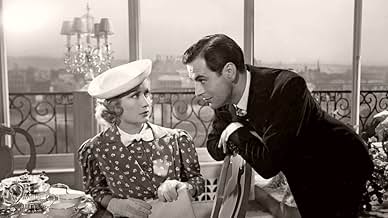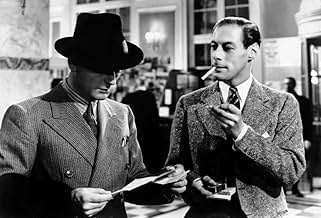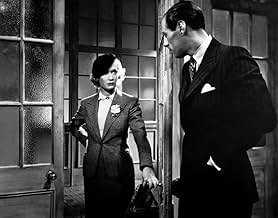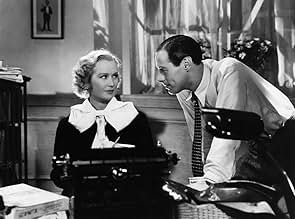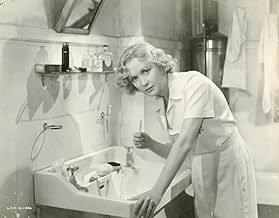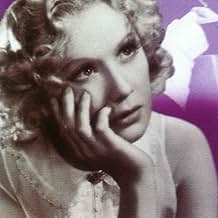NOTE IMDb
6,0/10
361
MA NOTE
Ajouter une intrigue dans votre langueActor Edmund Davey becomes a star overnight when his wife and co-star teams up with the secretary of a noted stage critic to produce a glowing review of his 'Othello'.Actor Edmund Davey becomes a star overnight when his wife and co-star teams up with the secretary of a noted stage critic to produce a glowing review of his 'Othello'.Actor Edmund Davey becomes a star overnight when his wife and co-star teams up with the secretary of a noted stage critic to produce a glowing review of his 'Othello'.
- Réalisation
- Scénario
- Casting principal
Lawrence Grossmith
- Stanley
- (as Laurence Grossmith)
Noël Coward
- Passer-by
- (non crédité)
Rosamund Greenwood
- Pianist
- (non crédité)
James Harcourt
- Porter
- (non crédité)
Michael Hogarth
- Cassio
- (non crédité)
Noel Howlett
- Cashier
- (non crédité)
Paddy Morgan
- Kitty
- (non crédité)
Nicholas Nadejin
- Iago
- (non crédité)
Avis à la une
Ann is the secretary for a theatre critic...a critic who is about to savage the performance of Edmond Davey as Othello. But something weird (and completely unbelievable) happens...the Mrs. Davey (who plays Desdemona) begs the secretary not to send the article to the printer. While I have no idea why, Ann does something else...she changes the article to make it appear as if the reviewer LOVED Davey's performance! Not surprisingly, Ann loses her job. But then she does something else very strange...she goes to see "Othello" and soon finds herself falling in love with Edmond! Eventually, he begins to feel the same and soon you wonder if the finale of the next production might REALLY result in the death of Desdemona!
There are two main problems with the film. A few performances are a bit shrill--particularly Miriam Hopkins as Ann. Additionally, again and again, the actions of folks (most often but not exclusively Ann) make little sense. For a better take on "Othello", try "A Double Life".
There are two main problems with the film. A few performances are a bit shrill--particularly Miriam Hopkins as Ann. Additionally, again and again, the actions of folks (most often but not exclusively Ann) make little sense. For a better take on "Othello", try "A Double Life".
MEN ARE NOT GODS, a fascinating precursor to the justly lauded Ronald Coleman film A DOUBLE LIFE which in some ways surpasses its better known remake, is a rare film where a first class performance in one style clashes with a film exceedingly well made in another.
Alexander Korda gives us a well told tale of a drama critic's secretary who becomes entangled in the lives of a rising actor and his actress wife only to have the actor fall in lust with her and endanger his marriage, his very life and that of his wife when the lust becomes a consuming passion. A superbly chosen cast and settings build the story - from the final use of London's famed Alhambra theatre in Leicester Square for the production of OTHELLO which is at the core of the film (we get wonderful stretches of the play in a fine pre-Paul Robeson interpretation) to tiny touches like the Actor waiting in the wings snuffing out his cigarette presaging his "Put out the light...and then put out the light" speech.
Character actor A.E. Matthews is excellent as the drama critic, Rex Harrison shines in one of his best early supporting performances as the young obituary writer in love with the girl, Sebastian Shaw a fine British actor little known on this side of the Atlantic soars as the Actor breaking through as Othello and Gertrude Lawrence, the great stage star whose film career rarely showed her to best advantage gives one of her best performances as the Actor's wife and Desdemona (we even get to hear her singing Shakespeare's "Willow Song" beautifully! - although it is unclear if this from from the Othello Suite of Samuel Coleridge-Taylor used in the film's on-stage Othello or a setting by the film's composer, Geoffrey Toye?).
The only jarring note - and not all will find it jarring - is the over the top performance from top billed Miriam Hopkins, then near the peak of a successful Hollywood career, as the Critic's secretary persuaded by the Actor's wife to alter a crucial review of her husband's performance. Hopkins (17 Broadway credits of her own from 1921 to 1959, so one cannot blame the failure of her performance to blend with the others on her lack of the stage experience of her co-stars), has her character go essentially mad torn between loyalty to the Actor's wife and the two men who want her. In 1936 the idea of greater attraction between Hopkins and Lawrence than between her and either Harrison or Shaw was unthinkable (and beside the point in the story), but in 2011, one may see an unintended subtext.
Producer Korda and director Walter Reich turned out a marvelously detailed and satisfying film despite the clash of styles, but I do wonder at the IMDb listed running time of 90 minutes. The Greek-issued promotional DVD I screened comes in at a smoothly edited 79:20. I'd love to find a "more complete" print, but it's hard to imagine what might have been left out of this one!
Alexander Korda gives us a well told tale of a drama critic's secretary who becomes entangled in the lives of a rising actor and his actress wife only to have the actor fall in lust with her and endanger his marriage, his very life and that of his wife when the lust becomes a consuming passion. A superbly chosen cast and settings build the story - from the final use of London's famed Alhambra theatre in Leicester Square for the production of OTHELLO which is at the core of the film (we get wonderful stretches of the play in a fine pre-Paul Robeson interpretation) to tiny touches like the Actor waiting in the wings snuffing out his cigarette presaging his "Put out the light...and then put out the light" speech.
Character actor A.E. Matthews is excellent as the drama critic, Rex Harrison shines in one of his best early supporting performances as the young obituary writer in love with the girl, Sebastian Shaw a fine British actor little known on this side of the Atlantic soars as the Actor breaking through as Othello and Gertrude Lawrence, the great stage star whose film career rarely showed her to best advantage gives one of her best performances as the Actor's wife and Desdemona (we even get to hear her singing Shakespeare's "Willow Song" beautifully! - although it is unclear if this from from the Othello Suite of Samuel Coleridge-Taylor used in the film's on-stage Othello or a setting by the film's composer, Geoffrey Toye?).
The only jarring note - and not all will find it jarring - is the over the top performance from top billed Miriam Hopkins, then near the peak of a successful Hollywood career, as the Critic's secretary persuaded by the Actor's wife to alter a crucial review of her husband's performance. Hopkins (17 Broadway credits of her own from 1921 to 1959, so one cannot blame the failure of her performance to blend with the others on her lack of the stage experience of her co-stars), has her character go essentially mad torn between loyalty to the Actor's wife and the two men who want her. In 1936 the idea of greater attraction between Hopkins and Lawrence than between her and either Harrison or Shaw was unthinkable (and beside the point in the story), but in 2011, one may see an unintended subtext.
Producer Korda and director Walter Reich turned out a marvelously detailed and satisfying film despite the clash of styles, but I do wonder at the IMDb listed running time of 90 minutes. The Greek-issued promotional DVD I screened comes in at a smoothly edited 79:20. I'd love to find a "more complete" print, but it's hard to imagine what might have been left out of this one!
Ridiculous, tone-wavering melodrama of women and the awful men they love, this British vehicle for American Miriam Hopkins showcases her at her most feverish, as the impulsive secretary to an unctuous drama critic. The West End-circa-1935 milieu is one of the film's most entertaining aspects, and it diverts us from the many plot improbabilities. Miriam, altering her boss's review to look more favorably upon a young actor playing Othello, becomes besotted with him, to the point of endangering his marriage. Gertrude Lawrence, as the wife and his Desdemona, displays none of the quirkiness or spontaneity that made her a stage legend in this dull part (one wonders why she took it), and Rex Harrison, as the obit writer wooing Hopkins, isn't given much to do and in fact exits the picture early. The writer-director does construct some forward- thinking visual elements, and the picture's refreshingly non-Production Code in its Brit sophistication about possible adultery. But the characters are so poorly drawn that we're not sure whom to root for, and Hopkins' dithering becomes tiresome.
Very interesting cast in this 1936 British film that predates A DOUBLE LIFE by nearly a decade.
Miriam Hopkins plays a secretary who alters a scathing review of an actor in OTHELLO at his wife's (Gertrude Lawrence) behest. The wife turns out to be correct and the actor (Sebastian Shaw) goes on to become the rage of London's West End. Hopkins then becomes obsessed with the actor and starts going to all the performances of the play. Shaw then become smitten with Hopkins and we get a parallel story of jealousy and rage finally played out on the stage as Shaw's Othello tries to kill Lawrence's Desdemona. All very intriguing and very well played with bits of humor here and there.
Hopkins is, as always, eminently watchable. She was a great actress whose reputation has rather dimmed with the passing decades, but in the 30s she ranked with the top star actresses and was equally at home in drama or comedy. Lawrence is interesting to see in a good role. Not a traditional beauty, but she was a major stage star in her day and she's very good in this film. Shaw is rather bland but does OK with the Shakespearean scenes.
Rex Harrision plays a gawky suitor after Hopkins. A.E. Matthews is very good as the theatre critic. Sybil Grove plays the painter in the park, Laura Smithson is funny as the acid maid, and Val Gielgud (brother to John Gielgud) plays the producer.
But Hopkins is the star. One wonders how she came to star in this British film for Alexander Korda since her Hollywood career was still going strong.
Miriam Hopkins plays a secretary who alters a scathing review of an actor in OTHELLO at his wife's (Gertrude Lawrence) behest. The wife turns out to be correct and the actor (Sebastian Shaw) goes on to become the rage of London's West End. Hopkins then becomes obsessed with the actor and starts going to all the performances of the play. Shaw then become smitten with Hopkins and we get a parallel story of jealousy and rage finally played out on the stage as Shaw's Othello tries to kill Lawrence's Desdemona. All very intriguing and very well played with bits of humor here and there.
Hopkins is, as always, eminently watchable. She was a great actress whose reputation has rather dimmed with the passing decades, but in the 30s she ranked with the top star actresses and was equally at home in drama or comedy. Lawrence is interesting to see in a good role. Not a traditional beauty, but she was a major stage star in her day and she's very good in this film. Shaw is rather bland but does OK with the Shakespearean scenes.
Rex Harrision plays a gawky suitor after Hopkins. A.E. Matthews is very good as the theatre critic. Sybil Grove plays the painter in the park, Laura Smithson is funny as the acid maid, and Val Gielgud (brother to John Gielgud) plays the producer.
But Hopkins is the star. One wonders how she came to star in this British film for Alexander Korda since her Hollywood career was still going strong.
A secretary (Miriam Hopkins) who works for a newspaper alters her theatre critic boss's (A.E. Matthews) review of newcomer Edmond Davey (Sebastian Shaw) in his role as 'Othello' at the behest of the actor's wife (Gertrude Lawrence). She ends up losing her job, but becomes obsessed with the actor and viewing as many performances as she can. He gets to know her and wants a relationship with the woman which leads to near tragic results.
An at times rather muddled melodrama that seems all over the place as it neither knows whether to be a comedy, melodrama, romance or even musical. It would become the model for the later more superior A DOUBLE LIFE (1947). Rex Harrison appears in a rather lively early role ina film produced by Alexander Korda.
An at times rather muddled melodrama that seems all over the place as it neither knows whether to be a comedy, melodrama, romance or even musical. It would become the model for the later more superior A DOUBLE LIFE (1947). Rex Harrison appears in a rather lively early role ina film produced by Alexander Korda.
Le saviez-vous
- AnecdotesAccording to a studio press book on this movie, the demolition of the Alhambra Theatre was delayed so that it could be used for staging the play "Othello" for this production.
- GaffesThe "goodbye" letter Ann writes to Edmund is not the same one as he is initially shown holding and reading. The words are the same, but the formatting is completely different. After speaking with Tommy, a close-up of the original is seen again.
- Citations
Barbara Halford: [to Edmund] Now, now go and find Ann - and say something nice to her.
- ConnexionsReferences Les trois petits cochons (1933)
Meilleurs choix
Connectez-vous pour évaluer et suivre la liste de favoris afin de recevoir des recommandations personnalisées
Détails
- Date de sortie
- Pays d’origine
- Langue
- Aussi connu sous le nom de
- Men Are Not Gods
- Lieux de tournage
- Hyde Park, Westminster, Greater London, Angleterre, Royaume-Uni(Ann and Edmund meet near the bandstand)
- Société de production
- Voir plus de crédits d'entreprise sur IMDbPro
- Durée1 heure 30 minutes
- Couleur
- Rapport de forme
- 1.37 : 1
Contribuer à cette page
Suggérer une modification ou ajouter du contenu manquant

